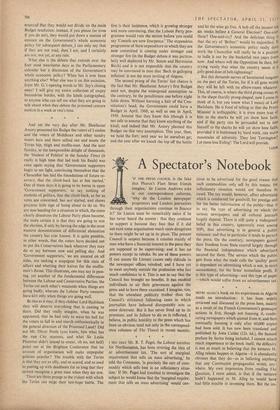I SEE THAT Mr. R. T. Paget, the Labour member
for Northampton, has been reviving the idea of ar advertisement tax. 'The sort of marginal requirement that sells on mass advertising,' he told the Commons, 'is precisely the sort of com- modity which sells best in an inflationary situa- tion.' If Mr. Paget had troubled to investigate the subject he would know that the 'marginal require- ment that hells on mass advertising' would con- tinue to be advertised for the good reason that such commodities only sell by this means; the inflationary situation would not therefore be eased. The tax would, however, affect advertising which is conducted for goodwill, for prestige and for the better information of the public—that is to say, the type of advertising on which the serious newspapers and all cultural journals largely depend. There is still quite a widespread belief in this country, apparently even among MPs, that advertising is in general a public nuisance; and that in particular• it tends to pervert the press. On the contrary, newspapers gained their freedom from State control largely through the financial independence which advertisers secured for them. The service which the public gets from what the trade calls the 'quality' press is dependent on advertising which is not, in strict accountancy, for the firms' immediate profit. It is this type of advertising—and this type of paper --which would suffer from an advertisement tax.














































 Previous page
Previous page